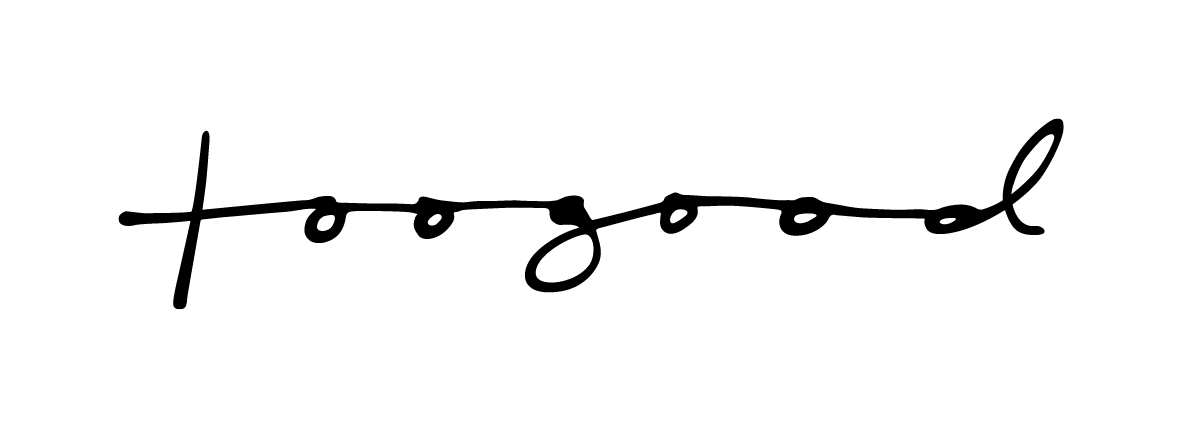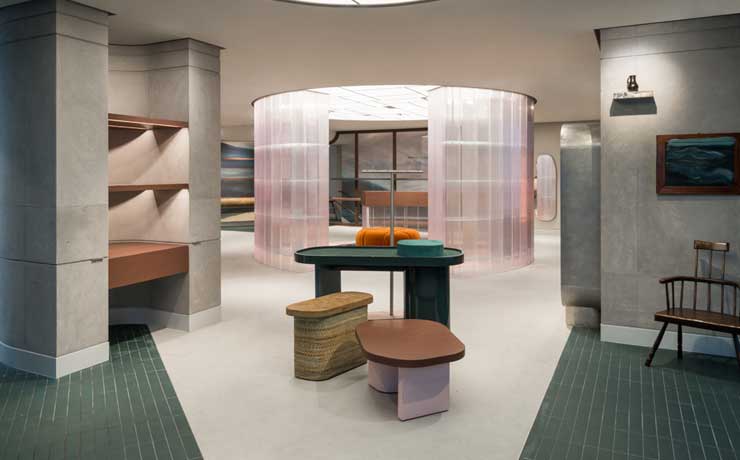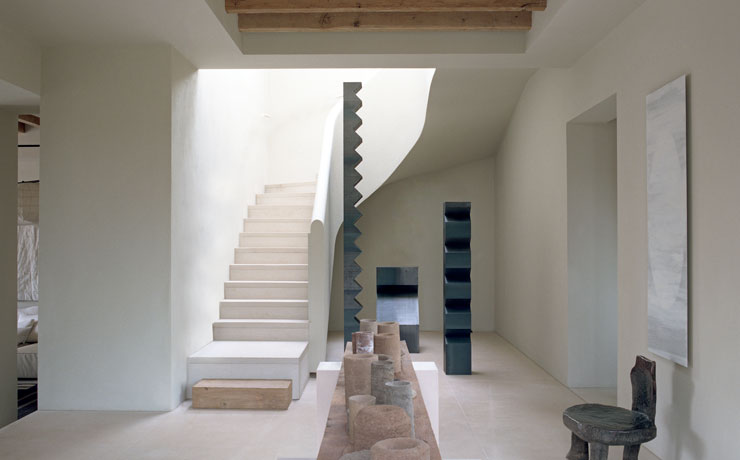2020年4月
流行
スカーレット・コンロンによる文
写真:トム・ジョンソン、ルーク・ウォーカー
Toogood がいかにして静かに持続可能な服を開発したか - マーケティングの宣伝なしで
フェイとエリカ・トゥーグッド姉妹が2013年にユニセックスでサステナブル、主に英国製のブランドを立ち上げたとき、彼女たちは「自分たちが何をしているのかわからなかった」と率直に認めている。今や彼女たちは、時代を超えたファッションにようやく目覚めつつある業界をリードしている。
「持続可能」、「季節を問わない」、「ユニセックス」、「時代を超えたデザイン」。これらはすべて、今ではおなじみのファッションコンセプトのように聞こえますよね。しかし、2013年にフェイとエリカ・トゥーグッドがファッションライン「Toogood」を立ち上げたとき、状況はまったく異なっていました。
姉妹のコレクションを特徴づけるユニセックスモデルは、発売当初はコンセプチュアルなものとして評価され、初期の頃はウィメンズ アワーの枠にふさわしいものだった。一方、長持ちするデザインを主張する姉妹のビジネス モデルは、ファッション業界全体とは相容れないものだった。覚えているだろうか? 当時は、ソーシャル メディアの影響で「新しさ」への飽くなき欲求が高まり、ブランドがそれを満たすために競い合っていた。その後、この道は、良くても維持不可能、最悪の場合は破滅的であることが証明された。
本能的にファッション分野に足を踏み入れた Toogood は、常に少し変わっていました。7 年前、著名なインテリア デザイナーのフェイは、有名な家具、アート、建築のプラットフォーム Studio Toogood をすでに設立していましたが、仕立てと演劇のバックグラウンドを持つ訓練を受けたパターン カッター兼デザイナーである姉の Erica こそが、完璧なファッション パートナーだと気づきました。ファッション業界の内部事情を直接知るわけではないものの、2 人はロンドンのセブン ダイアルズ地区で開催された 2013 年ロンドン デザイン フェスティバルのインスタレーション プロジェクトで協力し、49 着のコートを制作しました。各コートには、その地域の歴史的な職業 (「醸造家」や「人形遣い」など) の名前が付けられました。プロとしての姉妹関係が誕生したのです。「団結の瞬間でした」と Erica は言います。「規範的なものではなく、自由な精神でした。」
フェイは、ブランドを立ち上げるつもりはなかったが、控えめで美しく仕立てられた服を探している人がたくさんいることを知っていたと語る。友人、家族、同僚の中には、ハイファッションを着たり、ブランドものの服を買いたがらない人もいる。さらに、彼女は「パートナーたちと私たちのワードローブがぼやけ始め、スタジオのキッズ(彼女のチームへの愛称)がみんな同じような服を着始めている」ことに気づき始めた。
ユニセックスの服が今後も人気が続くだろうという彼らの予感は、彼らの期待を裏切らず、現在では Matchesfashion.com、ドーバー ストリート マーケット、セルフリッジズで取り扱われている。「私たちは、すべてのアイテムがユニセックスであるというアプローチから始めました。今ではメンズウェア寄りのアイテムやレディースウェア寄りのアイテムもありますが、大多数は純粋なユニセックスとみなされています」とフェイは言う。「もちろん、世界は完全にユニセックスではありませんし、そうである必要もありませんが、私は [境界が曖昧になること] がとても興味深いと思います。」
経験不足が彼らに良い視点を与えたと彼らは同意します。「私たちは、やりたいように物事をやるというルールを採用しました」とエリカは言います。「私たちはラインシートが何なのか、みんながどうやっているのかを知りませんでした。だから、一番理にかなった方法で物事をやっただけです」とフェイが同調します。
当初は、フェイがインテリア プロジェクトで余ったキャンバス ロールを活用し、最近ではデザイナーのフィービー イングリッシュとコラボレーションして余った生地を共有しました (余った生地は学校や慈善団体に寄付することもよくあります)。家族の素敵な思い出として、祖母は第二次世界大戦中にパラシュートで下着を作った仕立て屋でした。先駆的で持続可能な精神は、どうやら家族に受け継がれているようです。
しかし、ファッションブランドは高尚な「コンセプト」だけで運営するわけにはいきません。「人々は、私たちが常に最高のものを使用している素材と組み合わせた、彫刻的でシンプル、時代を超越したパターンカットの美学に惹かれます」とフェイは、彼らの作品が「永遠の」アイテムである理由について語ります。「それは人々が大切にする魔法の組み合わせです。」彼らの彫刻的なライン、機能的な配慮、そして絶妙な仕上がりは、「普段着」というありふれた概念を歪め、代わりに、着やすさと感情的な愛着を融合させています。
エリカがトゥーグッド デザイン スタジオの別館でアーティスト、建築家、製品デザイナーに囲まれて働いていることを考えると、すべてが目的と感情に根ざしていることは驚くことではありません。まるで家への投資のように、彼女は直感的に 1 シーズン以上も着られる服をデザインします。その好例が、彼女が最初のコレクションのためにカットしたパターンが今でもベストセラーであることです。
「私たちは作品をオブジェクトとして扱います。それがこの家のやり方だからです」と彼女は説明する。「椅子からズボンに至るまで、“作る”というプロセスはよく似ています」。彼らの作品の名前も同じ考え方に基づいており、職業にちなんで名付けられており、最初の共同プロジェクトを思い起こさせます。写真家ジャケット、パン屋ズボン、作家ドレスなど、いくつか挙げてみましょう。「職業のつながりが目的を与えてくれます」と、職人のつながりについてフェイは言う。「写真家にはレンズを入れるための大きなポケットが必要ですし、パン屋はかがんでパンをオーブンに入れるので、ズボンはすごくゆったりしていて、床に長く着けすぎてはいけません。そうしないと小麦粉まみれになってしまうので…」と彼女は笑う。
持続可能性はトゥーグッドが忠実に守っているものであり、フェイの言葉を借りれば「社内の考え方と道徳基準」だが、必ずしも声高に主張しているわけではない。そうは言っても、イギリスの素材、製造業者、工場を擁護するという彼らの取り組みは、最初からブランドのDNAの中核をなしている。彼らはヨークシャーとイングランド南西部のサプライヤーと協力し、姉妹が住むロンドンから工場へは簡単にアクセスできる。彼らがイギリス国外で生産する場合、それにはちゃんとした理由がある。例えば、彼らはポルトガルにシャツ工場を見つけたが、そこでは品質は最高で、輸送はカーボンニュートラルである。
彼らは時々つまずくこともある。例えば、2018年に発売したトゥーグッドのサステナブルな英国製デニムラインは短命に終わった。「私たちが作れる最も純粋なサステナブル製品だったんです」とフェイは説明する。「英国製ジーンズを作る英国企業でさえ、デニムをトルコ、アメリカ、中国から仕入れていますが、私たちはデニムをランカシャーから調達し、完全に英国製の製品を作りました」(「ちゃんとしたセルビッジでした」とエリカは物憂げに付け加える)。しかし、そのようなこだわりのせいで、ジーンズ1本が750ポンドという値段になった。これは小売店にとっては高すぎる価格帯だ。ポルトガル産オーガニックデニムを使った同じ形を、より低価格で9月に再発売する予定で、トゥーグッドのような小さなレーベルが買える量を考えると、「今のところこれが最高です」。
「いざというとき、私たちはみんな、何にお金を使うか考えます。物事には意味がなければなりません」とフェイは言う。今ほど真実味を帯びたことはないが、2013年にセブン・ダイアルズでインスタレーションを制作して以来、あるいはパラシュートパンツの頃から、トゥーグッドの精神の中心にあったものだ。
記事全文は、 こちらから現地でご覧ください。


